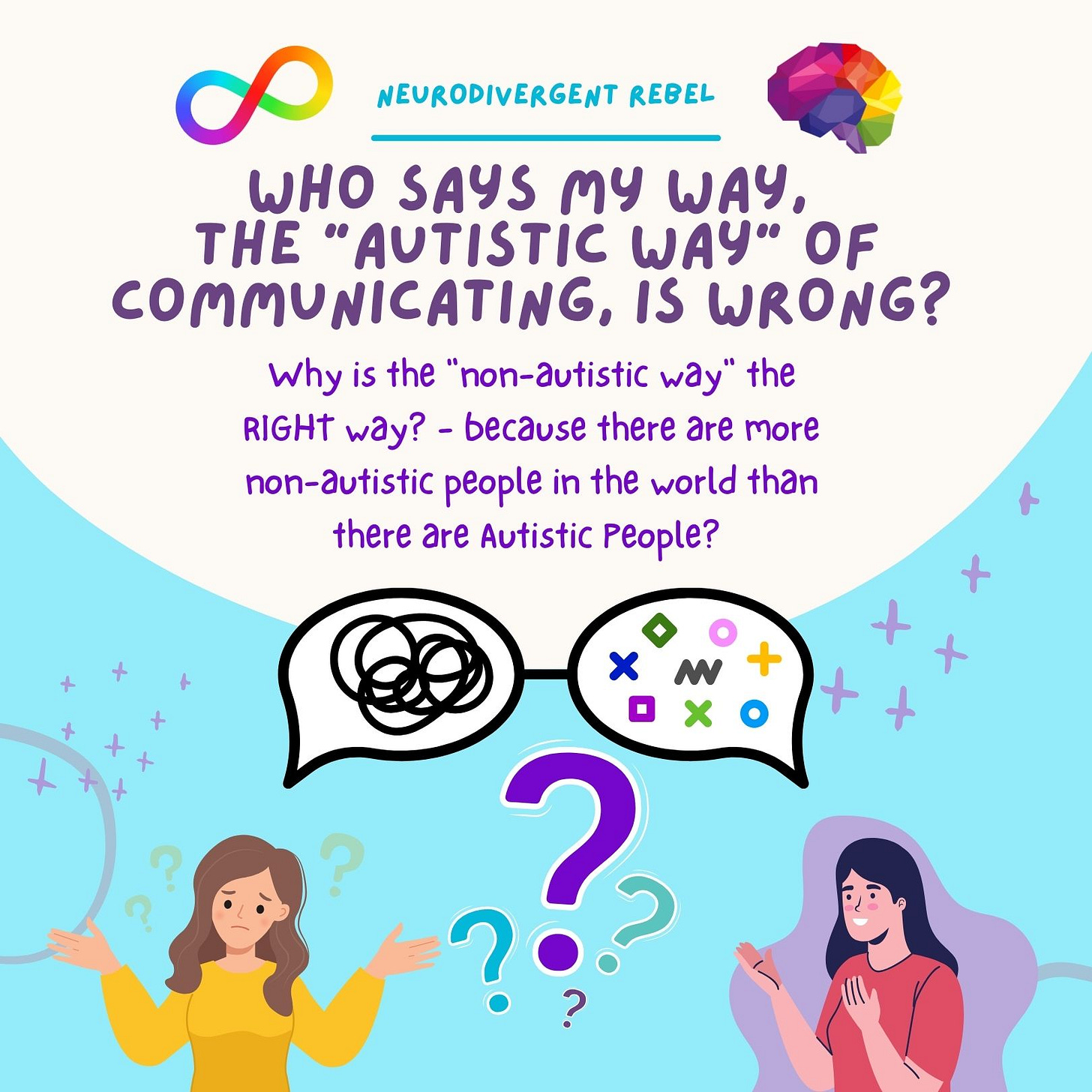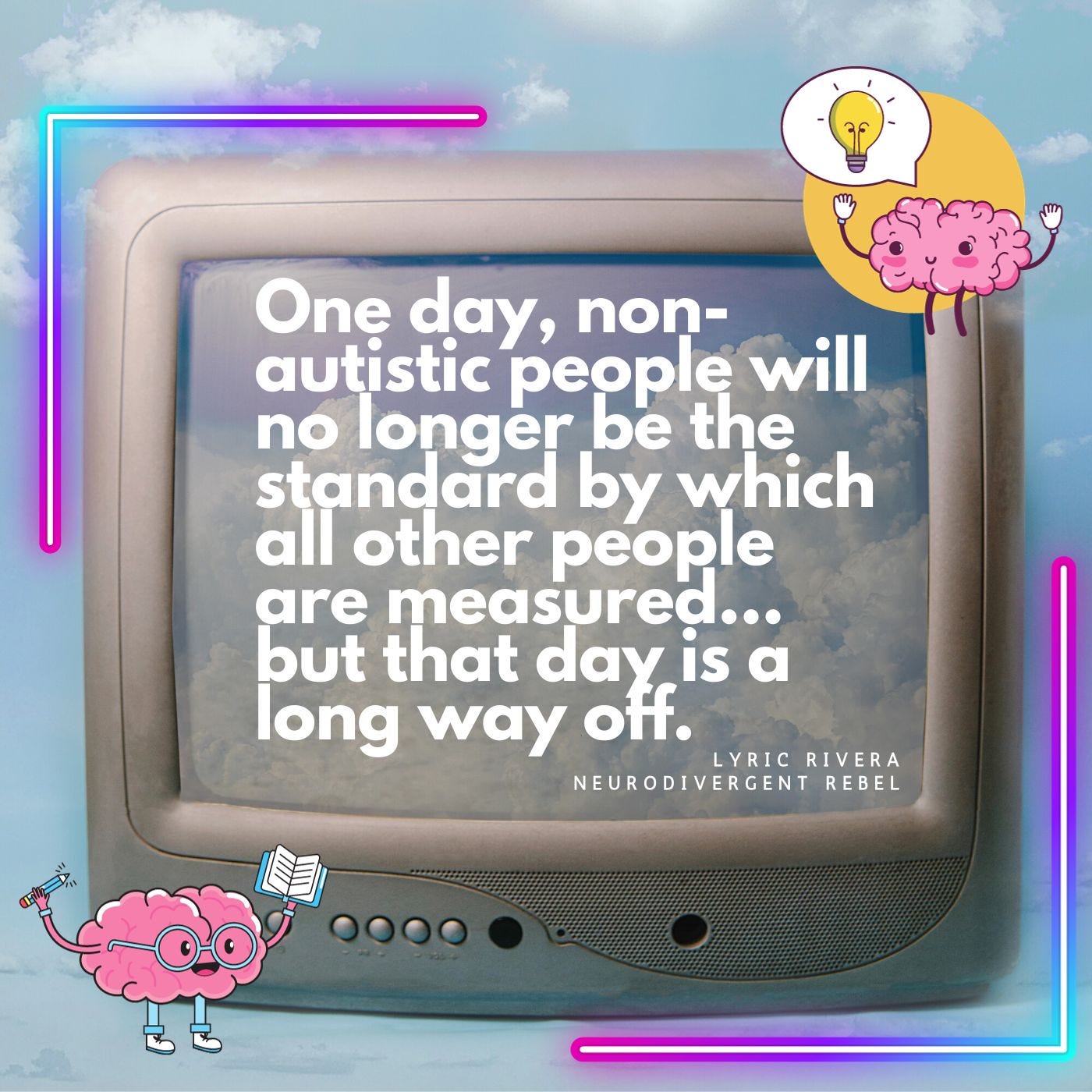Empathy for Autistic People: Autism and the Double Empathy Problem
Who says MY way, the "Autistic Way" of communicating, is wrong? Why is the "non-autistic way" the RIGHT way?
It has been years since Damian Milton rocked the world with the paper: On the ontological status of autism: the 'double empathy problem.'
In Damian's paper, the double empathy problem was defined as:
What does that mean in more simple language?
Our society has an unfortunate habit of pigeonholing Autistic and other NeuroDivergent people when we don't "fall in line" with the pre-determined neuro-typically driven social norms - because we're wired differently from our neurotypical counterparts.
We socialize differently because we experience our world (and communication) differently than non-autistics do, but this is often pathologized, and we are seen as the problem when confusion occurs.
The myth Autistics are cold, unempathetic, and emotionless comes partly from this Double Empathy Problem. It's not that Autistic people don't feel empathy (I experience OVERWHELMING empathy that can cause me to shut down) but that non-autistic people present and interpret our empathy differently.
Autistic people can fall all along the empathy spectrum, from overwhelming empathy to very little empathy - just like non-autistic people can.
Additionally, it can be harder to empathize with experiences you don't have (and needs you do not understand) regardless of one's NeuroType. This is where the Double Empathy Problem (and the confusion between cross-neurotype communication can cause trouble).
With Autistic people especially (because our communication differences can fall far outside of what's considered "normative" or average), this has led to our ways of communicating and experiencing the world being pathologized (instead of respected, supported, and appreciated).
I find it much easier to communicate with other Autistic People (who know they are Autistic) than with non-autistic people.
When communicating with other Autistic People (who are self-aware), there is a different level of compassion and understanding for my directness and the scattered nature of my thoughts. There is patience and kindness when I take something literally, miss a joke, get a word wrong, or need clarification about something (or struggle to find the words at all).
Other Autistics are willing to stretch to meet me where I am. I'm also eager to meet them where they are.
We're used to stretching ourselves to be understood by people unwilling to extend themselves to meet us where we are (it is also easier to communicate with other Autistic people).
In interactions with other Autistic People, I don't have to stretch myself as far as if I were accommodating a non-autistic person.
Funny, they say, "Autistic People are the ones with a deficit." Still, we're the ones accommodating non-autistics by adapting our communications so that non-autistics can understand us better - isn't it supposed to be the other way around?
Communication comes in two parts - outgoing message and incoming message (regardless of how the message is sent).
When two people communicate, the sender and receiver are BOTH equally responsible for ensuring a common understanding (and no misunderstandings have occurred).
This is similar to how when two people consent to behaviors that can create children, both parties involved in making the baby have a responsibility to that child (legally in many places).
Two people come together, swap thoughts and ideas (or fluid), and are BOTH responsible for what comes out at the end.
Unfortunately, this isn't always true with cross-neurotype communication.
All human communication depends on the sender and the receiver coming to a common understanding. Still, because non-autistics often communicate very differently from Autistic People (and aren't used to flexing their communication to accommodate others), Autistic people are often blamed for the misunderstandings resulting from these communication and processing differences.
This disparity is seen in the deficit-based descriptions of Autistic thought and communication through our global medical systems.
Speaking to a non-autistic person can be like talking to someone from another country with different customs, traditions, dialects, and ideas of what's "acceptable." I often find myself "on eggshells" when talking to non-autistic people because my bluntness, tone, posture, or body movements may unease me if I'm not careful.
Sometimes, struggle to predict what I will say or do that may set them off (because my ways of being often cause offense without intending to do so). I must stay ready and on guard, even when conversations are going well, as I know they can turn anytime.
When I am misunderstood, I will be expected to stretch myself to fill the void in the person I'm speaking to's understanding, and they won't afford me the same grace (that I'm required to extend to them).
Because I'm Autistic, it MUST be my fault. *eye roll
But who says MY way, the "Autistic Way" of communicating, is wrong?
Why is the "non-autistic way" the RIGHT way? - because there are more non-autistic people in the world than there are Autistic People?

It is thought by some that Autistic People lack (or have a deficit) in our theory of mind - which I disagree with.
TOM helps us in our understanding of other people, how they experience the world, and how our actions and thoughts will be perceived by others.
I'm reasonably good at understanding other Autistic People (and how they will perceive my actions and thoughts); however, I DO struggle to know how non-autistic people will interpret and perceive me (as they struggle to understand how an Autistic Person will interpret their actions).
Non-autistic people are just as bad at (if not worse at) understanding Autistic People as we can be at understanding them, with one exception - Autistic People are often EXPECTED to learn to understand and speak the non-autistic language. At the same time, non-autistics don't have the same pressure to comprehend how Autistics communicate.
Or, as Dr. Milton has said:
NOTE: Paid Patreon, Substack, Facebook, and YouTube channel members had access to this video on Monday, May 13, 2024. The video’s public release will be Friday, May 24, 2024.
Ten years after the original Double Empathy paper was released, an updated article with a few new thoughts on the Double Empathy Problem, called The 'Double Empathy Problem': Ten years on, was released in the fall of 2022.
In this more recent piece, it is theorized that:
Additionally, because of how widely accepted the Double Empathy Problem has become, this theory could lead to a radical change in current diagnostic criteria.
What would our diagnostic criteria look like if Autistic People weren't defined only in deficits or how we fail to measure up to our non-autistic peers?
What would our world be like if people understood and empathized with Autistic People?
Though times and the world are changing, this is not a reality I hope to see in my lifetime, though it is one that I do hope future generations will experience.
One day, I hope the world will know that Autistic people experience the world and express our emotions differently from non-autistic people.
One day, our differences won't be seen as wrong - or something that needs to be corrected.
One day, non-autistic people will no longer be the standard by which all other people are measured... but that day is a long way off.

What is crucial about Dr. Milton's Double Empathy Theory is that it challenges the prevailing narrative that Autistic people lack a theory of mind or empathy.
Our empathy is no less valid, heartfelt, or compassionate than non-autistic empathy is - Autistic empathy is simply not appreciated because it doesn't look like non-autistic empathy (which needs to change).
I grew up (falsely) believing I was broken, cold, and lacking empathy - because my expressions of my emotions differed from those around me.
Turns out, now that I understand myself and the human empathy spectrum (and the different kinds of empathy) better, I have a LOT of empathy - that is so intense it can flow out of me in unintended ways (or cause me to shut down entirely - which can give me a cold, unempathetic look to those who don't know what's happening beneath the surface).
When the world is too much, and I shut down, I can temporarily become disconnected from my feelings (and everything).
I freeze, and the world stops, and I implode on myself.
This pause is only a temporary fix to a sizeable emotional event. Those emotions that don't come out immediately (giving me a cold, composed appearance) will eventually come out later - with enormous force.
It's not that I don't feel. I feel a lot, and I also struggle to contain those feelings.
Shutting down (or lashing out when the feelings burst free) is not "accepted" in the world today (even if I can't help when my emotions take me to those extremes)... but one day, it might be.





I often notice when communicating with allistic people that, because of my need to overshare, they will often shut me down as soon as they hear something they don't want to hear, even though I haven't finished explaining my point.
Another thing, with regards to empathy - I don't see the point in empathy, in a situation that doesn't require it, but is otherwise expected in allistic society, so I end up having to "fake" a sort of empathy, even though I actually feel nothing. For example, my therapist had an operation, but I saw that she was fine, therefore I felt nothing. But, because of the allistic need for empathy, in all situations, I had to fake it. I actually told her afterwards that I felt nothing, because I knew she was fine, but that I'm trying to show a level of engagement that is expected.
So, I feel empathy greatly, when I believe that someone is actually hurt or hurting. After losing someone close, or my cats (who have always been closer), I've cried unending for several days, months with my cats. I just don't see the point in unnecessary empathy.